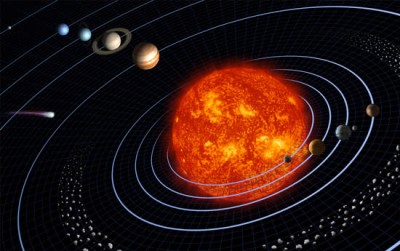
I recently read an interesting article (Intelligent Design: Humans, Cockroaches, and the Laws of Physics) from 1997 by Victor J. Stenger in which he combats the kind of fine-tuning arguments that are often evinced as ‘proof’ that our universe is carefully set up for the emergence of complex life forms like ourselves. What caught my eye me was his approach to the laws of physics:
‘However, the laws of physics, at least in their formal expressions, are no less human inventions than the laws by which we govern ourselves. They represent our imperfect attempts at economical and useful descriptions of the observations we make with our senses and instruments. This is not to say we subjectively determine how the universe behaves, or that it has no orderly behavior. Few scientists deny that an objective, ordered reality exists that is independent of human life and experience. We simply have to recognize that the concept of “natural law” carries with it certain metaphysical baggage that is tied to our traditional, pre-scientific modes of thought. We are going a step beyond logic to conclude that the existence in the universe of order, which we conventionally label as the laws of nature, implies a cosmic lawgiver.’
The status of laws of nature is an interesting topic in the philosophy of science and opinions are split along two axes. The first concerns whether laws of nature are prescriptive or descriptive, i.e., whether they govern or control the behaviour of their subjects or whether they describe it. Take, for example, the law of gravity: is the law of gravitation an elegant shorthand description of the way bodies behave or is it what makes bodies do what they do? There are two extreme ways of putting this dilemma: gravity is out there in the world or gravity is in scientist’s heads (and books). The mediaevals (who thought a lot about such matters in advance of what we would recognise as real science) talked about relations (pattern, order, structure, etc.) as being either de re or de dictu–a matter of reality or a matter of our speaking and naming reality.
The second parting of the ways over the status of natural law comes when we consider whether they are, so to speak, natural or artificial. How much does is the law of gravity simply ‘read off’ the face of nature and how much is it a projection of human ingenuity and creativity? How you answer says a lot about how you view language, imagination, and the relationship between human beings and the world.
In principle these two dichotomies are independent but in practice many scientists opt for a basically Humean combination: laws that are natural and descriptive. It’s a conjunction that supports a mechanistic worldview and scientific objectivity.
I’m inclined to want to dodge both dichotomies. C. S. Peirce’s semiotic conception of laws or ‘generals’ as cosmic habits is very interesting in this regard. It lets law be a kind of real relation (pattern, form, or structure) having its own proper existence in the cosmos without getting entirely Platonic about them. Peirce believed the relationship between human minds and physical events can only be understood when we understand the operation of signs. Semiotics offers an account of creation and creativity that may be able to avoid the split between the natural and the artificial. In such a scheme the laws of physics would be imaginatively constructed (created) forms which catch the form of reality (creation).